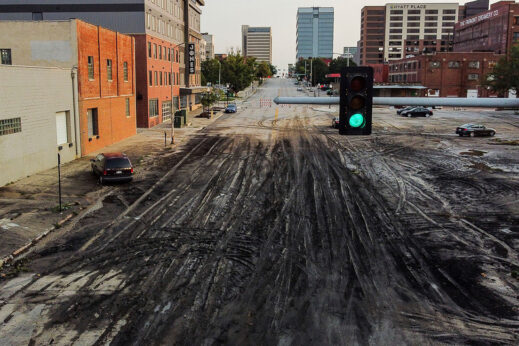
It’s too late to reverse the massive damage humanity has done to the Earth’s climate, and deadly weather is already baked into our future. That’s the conclusion from a depressing new report issued Monday morning by the Intergovernmental Panel on Climate Change, a United Nations body that forecasts the effects of human activity on the climate.
The grim assessment was confirmed by Linda Mearns, senior climate scientist at the U.S. National Center for Atmospheric Research. “It’s just guaranteed that it’s going to get worse,” she told the press. “Nowhere to run, nowhere to hide.”
The IPCC’s latest report—its sixth—estimates that Earth has gotten so warm to date that the planet’s temperature will likely race past the restrictions the Paris Climate Accord had recommended. That agreement set a goal of limiting the average global temperature increase to 1.5 degrees Celsius above pre-industrial levels in order to prevent irreversible climate damage.
Essentially, the IPCC says stopping that from happening is now impossible; Earth will hit the Paris agreement’s redline by 2040, perhaps sooner. And it will probably blow through a 2 degrees Celsius rise sometime by 2100.

The inescapable reality communicated by the report is that we are already living through the effects of climate change—they’re not something looming in the future. Also, it is clear that current emissions pledges made by governments are nowhere near enough and that big business isn’t going to lead the way toward change.
The IPCC doesn’t pander to any climate denialism, stating that it is “unequivocal” that human activity is responsible for the crisis we face. “Many changes due to past and future greenhouse gas emissions are irreversible for centuries to millennia,” the authors write. That means there’s no way to avoid some of the consequences brought on by uncontrolled environmental abuse over the last couple hundred years.
The scientists behind the report list all the evidence we’re already seeing around the globe: extreme heatwaves, flood-inducing precipitation in many areas, extended droughts in others, violent tropical cyclones and hurricanes, the disappearance of sea ice and snow cover, and the melting of permafrost.
The vanishing of Arctic sea ice is a particularly dire indicator of the trouble we’re in. Ice levels in the region vary throughout the year, but summertime retreats are now at their lowest levels in a thousand years. Even in its most optimistic scenario, the IPCC says the ice will disappear during summer at least once between now and 2050. This melting creates a feedback loop: Ice cover reflects solar radiation back outward, but darker bare water absorbs it, causing further warming.
All of these trends will get unavoidably worse, and the 3,000-plus-page report doesn’t rule out the catastrophic possibilities of a total collapse of the Arctic ice sheet or abrupt changes in the circulation of ocean waters—events which would trigger rapid and massive swings in global weather. Regardless, the world is already “locked in” to between 6 and 12 inches of sea level rise over the next 25 years.
The developments forecast in the report will contribute to a trend of not just more extreme weather but the likelihood of experiencing multiple climate disasters simultaneously, such as what’s happening now with heatwaves, drought, and uncontrollable fires all at the same time in the Western U.S., Greece, Turkey, and Russia.
In addition to carbon dioxide, long known to be a driver of global warming, the IPCC said that advances in science have also allowed for more precise measurements of methane and its role in short-term warming. Much of it is released into the atmosphere from natural gas leaks and livestock operations.
Though it highlights the irreversible destruction already caused or on the way, the report doesn’t completely throw up the white flag of surrender. There are still multiple scenarios open to the planet, ranging from less bad to total catastrophe, which can be pursued.

But achieving them will mean reining in the fossil fuel industry and its paid army of lobbyists that corrupt the democratic process. (It’s no coincidence that a lot of them have been involved in funneling money to the same right-wing lawmakers who tried to overturn the 2020 election during the January Trump coup.) And doing that will require people power to force governments and regulators to stop the greenwashing of business as usual.
UN Secretary-General António Guterres, who called the report a “code red for humanity,” said as much:
“This report must sound a death knell for coal and fossil fuels before they destroy our planet. If we combine forces now, we can avert climate catastrophe. But, as the report makes clear, there is no time for delay and no room for excuses.”
Data from the Climate Accountability Institute released in 2019 found that since 1965 some twenty companies contributed over a third of emissions of the most dangerous greenhouse gases. Leading the pack were capitalist energy giants like Chevron, Exxon, BP, and Shell and state-owned companies like Saudi Arabia’s Aramco and Russia’s Gazprom.
The timing of the IPCC’s forecast will set the terms of debate for an upcoming UN climate conference in Glasgow in three months which is expected to put pressure on governments to take serious action on emissions reductions and commit the required financial and political resources.
Major structural changes must be pursued immediately in the way nations produce energy and food and how they move people and goods. The warning has been sounded repeatedly by scientists, but politicians have ignored it. Rachel Cleetus, climate policy director at the Union of Concerned Scientists painted a target on their backs: “For far too long, policymakers have placed their short-term interests and the greed of corporations ahead of the needs of their constituents.”
Over a hundred countries have informally pledged to achieve “net zero” CO2 emissions. Only two nations—Suriname and Bhutan—have achieved it. Dozens of others have either passed or proposed legislation to do so. Others, like the United States, have done little more than talk.
Standing behind the politicians who refuse to act are the corporate campaign contributions that not only sabotage the climate but also destroy democracy. Michael Mann, a leading climate scientist, gets to the real heart of the problem:
“The great tragedy of the climate crisis is that seven and a half billion people must pay the price—in the form of a degraded planet—so that a couple of dozen polluting interests can continue to make record profits. It is a great moral failing of our political system that we have allowed this to happen.”
The most important pieces of climate change legislation in the U.S. Congress right now are to be found in the $3.5 trillion Democratic budget plan. It is the best chance to lock in cuts that would slash U.S. greenhouse gas emissions in half by 2030 (still not enough, but it’s a start). Among other things, the budget plan would also:
– Allow the U.S. to tax imported goods from countries not meeting emissions reductions.
– Set fees on emissions of methane.
– Set clean electricity standards to shift production toward wind, solar, hydro, and nuclear – achieving 80% clean electricity generation by 2030.
– Provide tax breaks for electric vehicles.
– Create Civilian Climate Corps to enlist young people to plant trees (also a job creation program).
Contact your Congressional Representatives and Senators and tell them to support the budget reconciliation plan.










